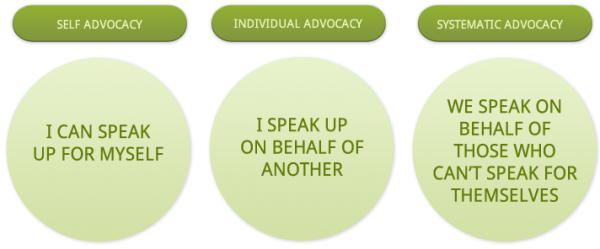Advocating with Clients
| Comments
In addition to increasing the access and supply of healthy and nutritious food available in the emergency food system, ending hunger will take substantial advocacy efforts that influence federal policy and legislation that benefit everyone in our state. Feeding Wisconsin is actively taking part in these efforts. Representatives from our food bank network often speak with legislators and policy wonks, advocating for improved public policies for our friends and neighbors living in poverty and for those living on the brink of poverty.
This is the traditional definition of advocacy, which according to the dictionary, is “pleading for, or supporting a cause or proposal.” We advocate because we are in the business of supporting the cause of ending hunger.
Often, people can find this definition a little scary. That's why we employ an expanded definition of “advocacy,” which is to simply storytelling. We create a space for our friends and neighbors to tell their stories which empower them to make positive change in their personal lives.
As a society, we have these hardcoded narratives about people with low-incomes that are often untrue and do not take in the complexity of their lives. If living with low-incomes is not hard enough, they also live in a shadow of misunderstanding that society places on them. This shadow that these untrue narratives casts is disempowering and makes it difficult for people to stand up for themselves to say what they really need. That’s why it is a priority for us to help our friends and neighbors realize their own voice.
On our FoodShare Helpline, we believe in interacting with clients on a personal level. We talk to people who may need just a little help and allow them to explain their circumstances, and provide a space to tell their unique story.
We highlight their strengths and note their need. We make referrals to resources in their community and educate them on their rights.
As advocates, we don’t make decisions for clients or speak on their behalf, but instead, we provide a space that empowers them to apply for programs that they are eligible for, and we act as a resource if their case is denied, questioned, or applied incorrectly.
Instead of advocating for a customer, we advocate with a customer. When our neighbors do enroll for their benefits and receive the assistance they need from our program, they express gratitude, and are often surprised at the positive experience they had with us.
For example, Sharon, a retired 75 year-old resident of Winnebago County called our Helpline looking for a helping hand. She wanted to apply for FoodShare but was uncomfortable going to the human services building her town.
In describing her situation, she expressed embarrassment, diminished pride, and helplessness. Having never asked for financial assistance in the past, she felt ashamed of calling for help. After explaining the FoodShare program, its benefits, and explaining the application process, she asked for help completing an application.
We talked through the application together, step by step. By the end of the process, she expressed, “I didn’t realize how easy the application process is.
"Thanks so much for helping me through this tough time. You made this so easy and you were so friendly and easy to talk to. I almost gave up on applying. Thank you”, she said.
Sharon is now receiving FoodShare and is able to live a healthier, more stable life.
We all have a role as advocates. You may be gifted at dialogue and persuasion, in which case lobbying may be your contribution. A friend or neighbor may need someone to speak on their behalf, and advocacy can be provided that way, too.
Other times, people like Sharon just need a guiding hand, which is the role that we take with our FoodShare Outreach Program.
Use your skills et and advocate for a cause and the people affected by that cause, and you may find that you can make a bigger difference than you originally thought.
September is Hunger Action Month. What advocacy role will YOU take this month?
